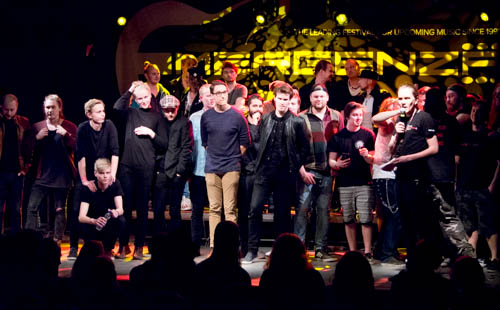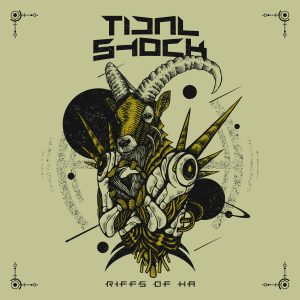[schema type=”person” name=”Janna Kukka” jobtitle=”Operator” worksfor=”Emergenza Festival Finland” ]
Interview by: Reija Myllynen
FI

Janna Kukka is one of the most visible names at the Finnish Emergenza team, making everything possible for the bands and the audience to have time of their life; year after year. We caught her right after the Finnish national finals to tell us about what’s it like from behind the scenes.
Interview: Janna Kukka @ Nosturi 7.5.16
Interviewer: R
Operator Janna: J
R: Is this the first time you’re in Emergenza or have you done this before?
J: This is now 4th time in row, so I’ve been in this for four years.
R: Can you compare this to the previous years, genre-wise or has there been any change in the quality of bands or something?
J: Well, maybe we’ve got more wider set of genres along these years and we’ve gotten bigger as a festival, so we have more bands than before. We get more genres with that, of course, but also because we choose bands to have a wide spectrum of different kind of music. But the overall quality of bands is high as hell here in Finland, and it has stayed equally high, so there hasn’t been any change in that.
R: Then I’d like to know, I know you have a terrible amount of organizing with this, of course, but if you think about an average day as an Emergenza Operator, what kind of a pile of practical problems you have to solve, what those may be?
J: Well, they can include, for example, that the venue doesn’t work out. So we’re organizing a festival there but then it’s not okay and then we start to dismantle it. So that has happened, for example, but an average day is like I can reach the people I need to contact. That’s the problem solving. We have 83 bands, which means 400-500 people, to keep in touch with and to keep everything in place so we can get the same information to everyone at the same time.
R: Surely. What about the schedules, have you ever had any kind of problems with someone needing a soundcheck, someone has this, other has that. I don’t know how well they keep you informed, and I saw that you handle it pretty well. I just wanna know how do you do that?
J: Well, it’s a result of quite hard work that we have a really professional crew. We have a team that sticks together, which is the number one, we know where other one is and we can coordinate ourselves to stay on clock, and we’ve never been more than 10 minutes behind the schedule. But it requires that everyone gives their full effort and that the bands pay attention to us, like we do to them. That’s how it is and if there’s something we’ve learned to do along all these years, it’s how to work as a team, which is essential, the team has to work or the festival won’t work.
R: Do you find any personal favorites like ‘hey, that I have to follow’ or do you get any feelings like ‘damn they didn’t win’ or can you stay completely objective?
J: Well, you try but you can never stay competely objective when you get to know people and see how they work. And all the small things like how they talk to you or behave, they all influence but fortunately we can’t affect to the results, so it doesn’t matter if I’m not competely objective. Because the audience and the judges decides the results.
Of course, you’ll get fond of some bands and you notice that they have a good show, which also means that I do a lot of co-operation with bands that have attended in, and have sticked in my mind really well from previous years. I always think about the bands that have been in Emergenza if I have an open slot and I need a band. So this is also a good way for bands to show that they’re serious and they want to play gigs, and then I’ll notice them afterwards, when Emergenza is over; they may even become my friends.
R: And then a totally horrible question, can you say any number how many bands have sticked into your mind. We’re talking of four years but about? Are we talking about 100, or 50, or are we talking about 20 bands?
J: Well, I’d say we’re talking more about 10-20 bands that have sticked in my mind very strongly but the spectrum can vary afterwards. You bump into them afterwards, in some connection and remember the members and… But there’s about 20 that have very strongly influenced.
R: Have you got anything to your own way of listening to music from here?
J: I’ve had, a lot. I listen really much to new and rising bands, I have to, just because of I’ve found so damn good bands from Emergenza that I want to listen to. (laughter.) And then of course, some songs, for example the winner of 2014, Revel Crow, has a one damn good song that I still listen to, and I just can’t get enough of it.
And there’s also that I work full-time on restaurant business and I make the playlists to our restaurant by myself. So I use really much bands that have been playing in Emergenza.
R: Already familiar, so it’s easier to use or?
J: Yeah, I know them already, and I think they’ll get more listeners by that because people comes to me and really asks that ‘hey, what band is this?’ And then I tell them that they’re this band and they’re like ‘okay, wow’ and writes down the name.
R: Yesh. How did you actually got into this in the first place?
J: Yeah, I study this business, cultural production, and I got a trainership by chance and I realized that this is what I want to do so this the path I chose then.
R: I know that many that wants to, if not onto the stage, then at least working next to it. What advice you could give to them?
J: Hmm… Be active. And the best way is really to contact. We need trainees too and I gladly take them but there are surprisingly few applicants. And I’ve worked in quite a few festivals and all of those are pretty easy to get into work if you just apply. It doesn’t really need else than being active and ask for work because many festivals are working by volunteers.
If you want to be in culture business, I have to say that you’ll have to start from working for free. So I’ve been doing this kind of work really much for free before getting any kind of salary. You can’t assume that you’ll get paid immediately, and I worked for free so long that I decided I was qualified enough to get paid for it. So it requires hell lot of work, like in being in a band, for example.
R: Yeah, they can’t wait anything for how many gigs, unless something really unusual happens.
J: Yes, and with an open mind and working hard, like in many other businesses, but I hope that people would apply for work more. Even to us, you can apply, I’ll gladly take trainees.
R: Then a little bit about this Emergenza as a whole, is there something that has sticked in your mind or invoked vibes?
J: I’ve got most vibes from how bands have grown so much, meaning when I’ve followed them since the qualifications and seen the first gig, so I get the feeling that i must see them from the front row, now that they’ve got here to the finals on Nosturi’s stage and become so good it’s like, ‘what’s going on in here? These guys are incredibly good.’
That’s the feeling number 1, that bands have seen so much effort for this, it’s really unbelievable.
R: Then… does Emergenza/Janna still have something to say?
J: Great thanks to the people who come to see shows, because these events couldn’t exist without people who come to see them. So thanks to everyone who are still going to live gigs and supports live music, because we wouldn’t have live shows without you.

Upper photo by: Janna Kukka
Lower photo by: Juho Karila









More articles
Interview with: The Foreshadowing
Wind Rose – Track By Track
Interview with PRIEST – June 2024